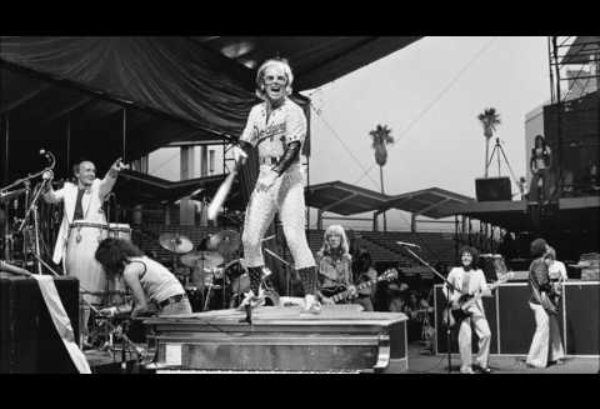When his “Island Girl” hit No. 1 in the U.S. on Nov. 1, 1975, Elton John was extremely exhausted.
Nearly one year earlier, his duet with John Lennon, “Whatever Gets You Thru the Night,” also peaked the Billboard Hot 100. The autobiographical Captain Fantastic and the Brown Dirt Cowboy, published in the springtime season of 1975, became the first record to debut at No. 1 in the U.S. The next October Elton John performed history again when he released Rock of the Westies, another No. 1 debut.
“No one had ever done that before — not Elvis [Presley], not the Beatles — and now I’d done it twice, in the space of six months,” John wrote in his 2019 autobiography, Me. “I was 28 years old and I was, for the moment, the biggest pop star in the world.”
“It was a pinnacle, and I was smart enough to know that it couldn’t last, at least not at that pitch,” he wrote in Me. “Success on that level never does; it doesn’t matter who you are, or how great you are, your records aren’t going to enter the chart at Number One forever.”
Frustrated with the path his career had appeared to take, he silently looked ahead to the turmoil of quieting down.
“I knew someone or something else was going to come along. I was waiting for that moment to happen, and the thought of it didn’t scare me at all,” he added. “It was almost a relief when the second single from Rock of the Westies, ‘Grow Some Funk of Your Own,’ wasn’t a huge hit. For one thing, I was exhausted: exhausted from touring, exhausting from giving interviews, exhausted by the ongoing catastrophe that was my personal life. And for another, I’d never really set out to have hit singles. I was an album artist, who made records like Tumbleweed Connection and Madman Across the Water, and I’d inadvertently become this huge singles machine, having smash after smash after smash, none of which had been intentionally written to be hit singles.”
Before it could happen, John stirred on. As “Island Girl” was climbing to the top, Tom Bradley, the mayor of Los Angeles, announced the last week of October as “Elton John Week,” in recognition of John’s expected shows at Dodger Stadium.
“We were having a great time,” John is quoted as saying in Philip Norman’s 2001 biography, Sir Elton: The Definitive Biography, “but something inside me was so revolted by the thought of constant touring that I just wanted to say ‘I’ve had enough.'”
It occurred several days before the Dodger Stadium performances when he tried killing himself in the presence of his friends and family at his Los Angeles home by using a handful of Valium and throwing himself into his pool. After gaining, he performed on Oct. 25 and 26, performing to sold-out crowds of over 100,000 audiences between the two nights. “Island Girl” was included on the setlist for both nights. For John, the energy of the concerts presented much-needed new life.
“That’s the thing about playing live, for me at least,” he wrote in his autobiography. “Even now, whatever turmoil I might be going through just gets pushed aside. Back then, when I was onstage I just felt different from when I was offstage. It was the only time I really felt in control of what I did.”

